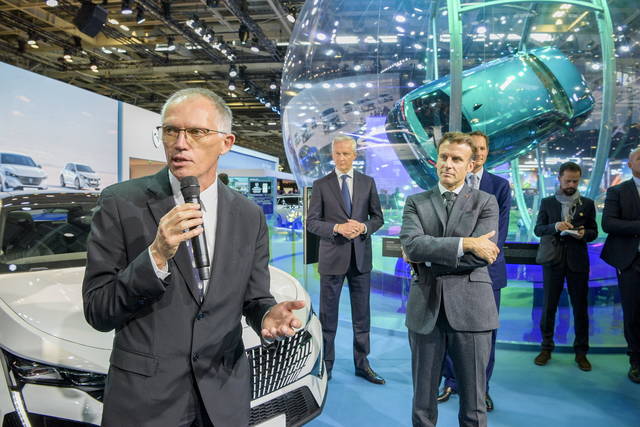ASYMMETRIC SITUATION – At the 2022 Paris Motor Show (who alVolante’s special) Carlos Tavares (left pictured above together with French President Emmanuel Macron) has clearly set out his thoughts on imports of Chinese cars to Europe: “Quite simply, we should ask the European Union to impose on Chinese manufacturers that export cars to Europe the same conditions under which we Western manufacturers export to China.” The CEO of Stellantis pointed out that Chinese brands must pay duties by 10% to import cars into the European Union while European car manufacturers are confronted with duties between 15% and 25% to export vehicles built in Europe to China.
WILLING TO SELL AT A LOSS -For Tavares the pitfall is twofoldas Chinese carmakers could gain market share in Europe sale their cars at a loss at the beginning of their expansion. The point is that “the European market is completely open to the Chinese and we do not know if their strategy could be to gain market share at a loss and raise prices at a later date.” a meeting between the French president and the executives of the French car manufacturers. At the end of the meeting Carlos Tavares reported that “President Macron agrees but there must be a European front broader than saying that the Chinese are welcome in Europe as long as they compete with us under the same rules. “And the CEO of Renault, Luca De Meo, highlighted how the challenge is played even at the beginning of the supply chain: “Extraction and refining they are 80% in Chinese hands. European industry must begin to take it back “.
IT’S WAR ON ELECTRICITY – The issue is particularly heated in the electric vehicle sector, with the Chinese which not only produces many but has almost the monopoly of minerals necessary to build the magnets of the motors, the batteries and the electronic components that manage everything. President Macron, interviewed by The echoesasked for a reform of the incentives for electric vehicles in order to better protect European car manufacturers from non-European competition. Macron cited not only the tariff imbalance between Europe and China but also US plans to introduce tax credits for automakers that produce components for electric vehicles in the United States. This plan has worried both the European Union and South Korea (who the news) and Macron highlighted that “Americans will buy American products and they will introduce very aggressive government incentives. The Chinese are closing the market and therefore it is not possible that the European area, the most virtuous in terms of fighting climate change, is the only one not to protect its production “.
SOMEONE REMA AGAINST? – Autonomous Europe raises a doubt: a possible plan for increase tariffs on Chinese imports could it find resistance from Germany? German carmakers are deeply rooted in China and have significant market shares. An increase in tariffs could be seen in China as a provocation and it has already been seen that Chinese consumers have reacted quickly, boycotting foreign brands, to actions perceived as attacks. The agency Transport and environmentactive in research on sustainable transport, offers a different vision: in one of his studies he argues that Chinese brands increase their share in Europe also because European manufacturers are slowing down the production of electric cars. Julia Poliscanova, Senior Director of T&E, states that “European car manufacturers have curbed their electric car offers just as Chinese and American competitors are releasing new models at a fast pace”.
WILL THE SCREWDRIVER FACTORIES COME BACK? – T&E report reports that Chinese brands currently account for 5% of the European electric vehicle market. Julia Poliscanova basically agrees with President Macron and Tavares when she concludes that “if Europe wants to maintain the competitiveness of its automotive industry, it must introduce its own strong industrial policy that corresponds to the massive support that the Chinese and Americans put in place on their electric vehicles. The climate and jobs of the European continent are at stake ”. In fact, the arrival in force of the Chinese brands is already underway: NIO has landed in Northern Europe with its top sedans and is experimenting with battery swap (who to learn more) while BYD recently unveiled its European range (who to know more). We will review the situation of the 1980s when the Japanese manufacturers, to respond to European duties, founded the factories ‘screwdriver’ (mostly in England) who basically limited themselves to assembling Made in Japan components?


